You have to be living under a rock if you have no idea or are yet to associate with eCommerce. As of 2023, eCommerce is rising and is expected to be a 17.50 trillion dollar market in the next seven years. By utilizing cloud computing in eCommerce, businesses can tap into a plethora of resources and tools that can aid in optimizing their operations.
Interestingly, the growth of eCommerce has also pushed the popularity of cloud computing as a commercial solution.
By adopting cloud computing eCommerce solutions, businesses may gain access to flexible and scalable resources that enable them to manage their online storefronts efficiently and effectively.
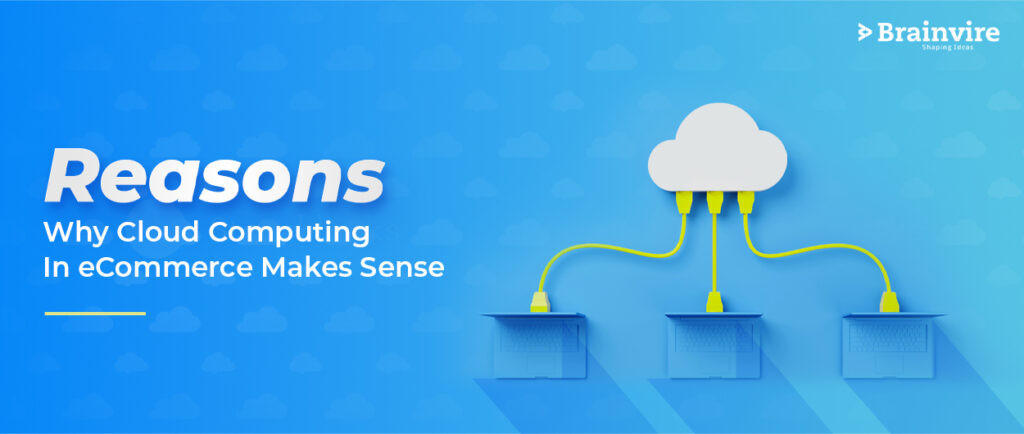
Cloud Hosting for eCommerce offers various advantages, including decreased prices, increased security, and enhanced speed. In this article, we look at the different aspects of cloud computing and decrypt how it adds to different organizations.
How Cloud Computing Adds To Your eCommerce Business
While cloud computing might look like one element of running a successful eCommerce venture, it’s not. Instead, if we look into it, several elements make cloud computing a crucial factor for your operations.
The following section highlights some core aspects of integrating your eCommerce venture with cloud computing. But first, let’s check out how the power of the cloud adds an edge to your operations.
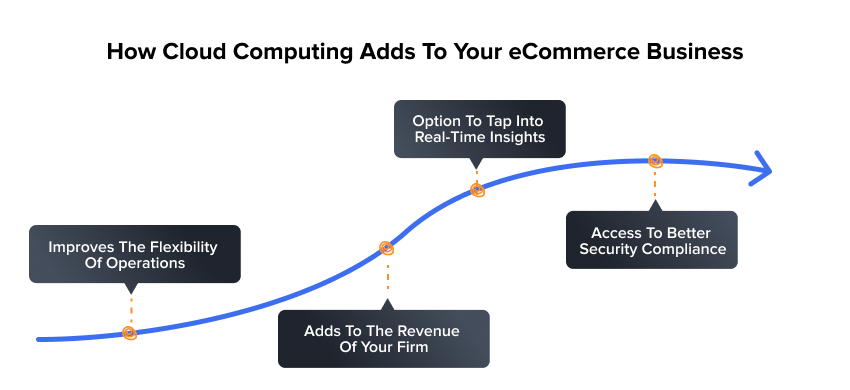
a. Improves The Flexibility Of Operations
The ability to scale and adapt is a major benefit of cloud eCommerce solutions. For example, using cloud computing, online retailers may scale up or down their computer power in response to fluctuating demands.
This frees companies from the responsibilities of operating their own on-premises hardware and applications as their IT needs to grow or shrink. To keep their website running smoothly and efficiently even during busy shopping seasons.
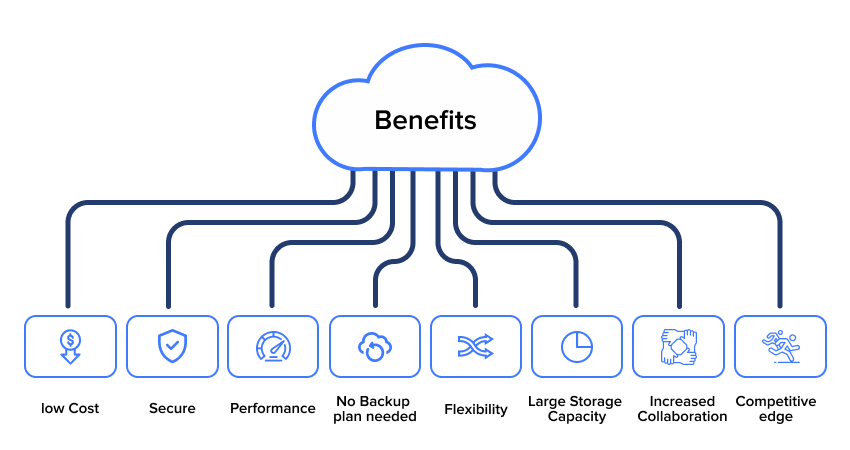
In contrast, the company can reduce its processing capacity during slower times to save money. Traditional on-premises solutions only allow for this scalability if they necessitate pricey software and hardware purchases in advance.
b. Adds To The Revenue Of Your Firm
Besides being the latest eCommerce industry trend, cloud computing adds to your revenues, making it a major perk of the solution.
When switching to a cloud medium, businesses save on hardware, software, and the money that goes behind the maintenance of these systems.
What’s more? You get access to different pricing models when switching to cloud-powered eCommerce systems. These are generally flexible and have features like ‘pay-as-you-go.’ This way, businesses only pay for the services they use, allowing online retailers to save money by subscribing to only what’s necessary.
c. Option To Tap Into Real-Time Insights
Websites tend to take shorter loading times when connected to a cloud database. This generally happens because the cloud is a network of interconnected servers for real-time results. Besides, cloud services offer Service Level Agreements (SLAs) to ensure seamless service.
Here, eCommerce websites can greatly benefit from such customization options offered by these solutions. Providers in the cloud, for instance, may offer hosting settings tailored especially for online stores.

Website performance, speed, and security can all be enhanced by deploying in one of these settings, including database optimization, content delivery networks, and web application firewalls.
d. Access To Better Security Compliance
Cloud-based eCommerce solutions can improve website security and regulatory compliance. Cloud hosting companies usually employ stringent security procedures to protect their clients’ data and systems. Network encryption, access controls, threat detection, and reaction are all examples of countermeasures.
Online retailers can get assistance meeting regulatory standards, such as PCI DSS, from their cloud hosting providers (PCI DSS). Each eCommerce business that accepts credit card payments must adhere to this standard, which describes the necessary security measures.
[Also Read: Integration of Adobe Commerce Cloud and Odoo POS for an Omnichannel Experience]
So now that we have an idea of the core factors that add to your eCommerce venture, let’s look at these perks in detail in the following sections.
I. Scalability & Flexibility
Cloud computing’s scalability and flexibility are two of its most appealing features, especially for online retailers. Both phrases describe how well a system or infrastructure can adapt to varying levels of use or demand.
Scalability and adaptability are essential to ensure that eCommerce sites can keep up with client demand and survive periods of high traffic volume.
Here’s how the factor adds to your business:
Cloud-based Infrastructure
Cloud computing’s adaptability and scalability can be traced back to its cloud-based architecture. Instead of maintaining their gear and software, eCommerce enterprises can use this infrastructure to access computer resources like processing power, storage space, and memory remotely over the internet.
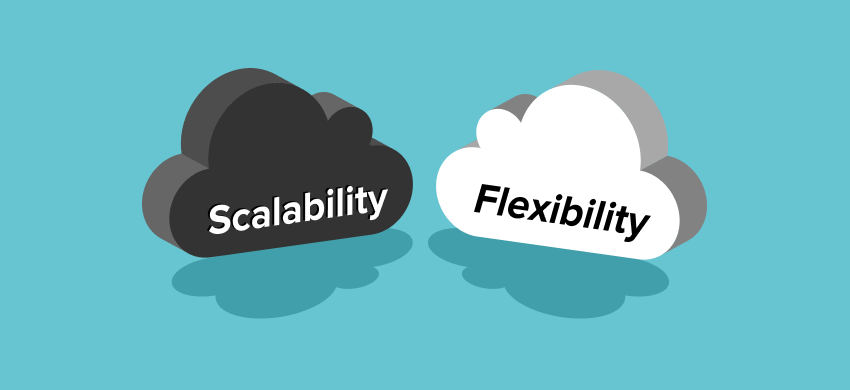
Amazon Web Services (AWS), Google Cloud, and Microsoft Azure are examples of cloud providers that run enormous data centres with thousands of servers and other bits of computer hardware. eCommerce enterprises can use the cloud services offered by these suppliers to create and run their websites and other applications, such as virtual machines, databases, and storage.
Dynamic Resource Allocation
Dynamic resource allocation is a crucial element of cloud-based architecture. This allows cloud service providers to automatically meet user demand for computing power by following rules and policies.
In the case of an online store, for instance, a threshold of 80% CPU consumption could trigger the deployment of additional resources.
Online stores may now automatically scale up or down in response to fluctuating demand thanks to this dynamic allocation of resources. This can aid in keeping websites operational and user-friendly during times of high demand.
Scaling Up & Down Based on Demand
By increasing capacity, online retailers can meet surging customer demand. To accommodate the influx of holiday shoppers, an online retailer, for instance, may need to raise the capacity of its servers.
However, costly hardware and software acquisitions and hiring specialized personnel to oversee and maintain the system would be required without cloud computing.
When demand is low, eCommerce enterprises can minimize expenses by scaling down. For example, an online store’s computing demands may be lower off-season than during the busy holiday shopping.
When demand is low, eCommerce enterprises can minimize expenses by scaling down. An online store’s computing demands may be lower off-season than during the busy holiday shopping.
Online retailers can reduce infrastructure expenses by cutting back their computing resources without compromising performance or dependability.
II. Cost Savings
The cloud may help online retailers cut costs, a major perk for any firm. Businesses can save money on hardware and upkeep by using cloud computing solutions, and they can also benefit from a pay-as-you-go pricing model and more manageable prices.

With these monetary savings, eCommerce businesses can better concentrate on expanding their operations, enhancing their customer service, and adapting to a dynamic market.
Here’s how the factor adds to your business:
Reduced Hardware and Maintenance Costs
Cloud computing’s ability to help eCommerce businesses cut down on costly hardware and upkeep expenses is a major benefit. Businesses have historically had to make large investments in on-premises infrastructure, including servers, storage, and networking gear. These hardware expenses might pile up quickly, and firms would need to plan for upgrades and repairs.
With cloud computing, hardware expenses are no longer a concern for enterprises. Alternatively, they can take advantage of the infrastructure offered by their cloud service provider and rest assured that it will be regularly maintained and enhanced.
This allows companies to quickly add or remove computing capacity as needed without incurring the high expenses of owning and maintaining their hardware infrastructure.
Cloud computing can help organizations save money on energy bills and lower hardware and maintenance expenses. Providers in the cloud often deploy data centers designed to minimize their energy footprint and save money. Consulting with an Adobe Experience Manager consultant can further optimize cloud-based solutions, ensuring efficient content management and seamless digital experiences.
Pay-As-You-Go Pricing Model
Pay-as-you-go pricing is another way cloud computing helps eCommerce companies save money.
This eliminates the need for establishments to invest in a minimum level of processing power up front, and instead, they pay only for the resources they employ.
Businesses can adapt more quickly to shifts in customer demand because of the flexibility afforded by pay-as-you-go pricing. For instance, during the hectic holiday shopping season, a company may boost its computing resources to serve its customers better. Conversely, IT budgets can be slashed when business is slow to save money.
Businesses can save much money with the pay-as-you-go model since they don’t have to buy expensive equipment or software upfront. Instead, companies can only pay for the resources they utilize, allowing for more flexible budgeting.
Predictable and Manageable Expenses
With cloud computing, eCommerce organizations might have lower, more controllable costs. Businesses used to have to allocate funds to purchase hardware and software and for upgrades and repairs when they relied on on-premises infrastructure. These costs might be hard to estimate and organize, especially if unforeseen complications emerge.
Yet, thanks to cloud computing, costs for organizations are much more controlled and consistent. Cloud service providers’ pricing structures are normally transparent and straightforward, with no surprises or additional expenses. This facilitates IT cost forecasting and budgeting, reducing uncertainty for businesses.

In addition, many cloud service plans provide access to the provider’s help desk and other maintenance services. Because of this, companies can receive first-rate assistance without having to allocate more staffing or money.
III. Improved Performance & Reliability
Every eCommerce platform needs to have improved performance and reliability. Customers demand websites to be quick, responsive, and trustworthy in today’s crowded marketplace. Sales, customer satisfaction, and brand equity can all take a hit if an eCommerce site is unstable or takes too long to load.
High availability and uptime, geographically distributed data centres, and Robust disaster recovery capabilities are just a few of how cloud computing can enhance performance and reliability.
Here’s how the factor adds to your business:
High Availability And Uptime
High availability and uptime are two key benefits of cloud computing for online stores. Regarding uptime, most cloud hosting providers offer SLAs with guarantees as high as 99.99%.
This implies that the website will be accessible to customers around the clock, allowing them to shop, pay, and get in touch with support whenever they choose. In addition, by switching to cloud computing, companies can avoid the downtime and service interruptions of traditional hosting solutions.
Geographically Distributed Data Centers
Geographically dispersed data centres are another advantage of cloud computing for online stores that use the service. Many companies offering cloud hosting have data centres in several different geographical areas.
That way, clients worldwide can readily access the company’s website, which will be hosted in numerous locations simultaneously. As a result, more sales, happier customers, and quicker load times are all possible outcomes.
The website will continue to function in the case of a regional outage or disaster thanks to the redundancy and failover capabilities provided by the data centres’ geographical distribution.
Robust Disaster Recovery Capabilities
Finally, cloud computing has excellent disaster recovery capabilities, aiding firms in quickly resuming operations after a crisis. Cloud hosting companies often offer backup and disaster recovery solutions. They can copy data automatically to various places, keeping crucial data safe and accessible in the case of a disaster.
This ensures that firms can bounce back swiftly from any disruption, whether a natural disaster or a cyber attack.
IV. Enhanced Security & Compliance
Any online store needs robust safety measures and regulatory conformity as a minimum. In addition, companies now have a greater responsibility than ever to safeguard their customers’ financial and personal data from growing cyberattacks.
Comprehensive security features, conformity to industry norms and laws, and frequent security updates and patches are just a few of how cloud computing improves security and compliance.
Here’s how the factor adds to your business:
Comprehensive Security Features
Comprehensive security measures are one of the main benefits of cloud computing for online stores. Many layers of protection, such as firewalls, IDS/IPS, encryption, and multi-factor authentication, are available from most cloud hosting providers.
These additions strengthen security in the face of hacking, data theft, and other online dangers. Cloud hosting companies typically employ full-time security staff to monitor their systems and deal with potential threats.
Compliance With Industry Standards & Regulations
Another advantage of cloud computing for eCommerce is that it facilitates compliance with industry norms and laws. For example, sensitive data must be handled and stored under industry standards in many fields, including healthcare and finance.
Hosting companies in the cloud often have the manpower and resources to assure compliance with standards like HIPAA, PCI DSS, and GDPR. If a company uses a cloud hosting service that meets these requirements, visitors to the site and the company’s data will be safe.
Regular Security Updates & Patches
Improving security and conformity also requires applying patches on and regular basis. Cloudloud hosting companies upgrade and patch their systems frequently to close security holes.
Doing so may assure them that their infrastructure is secure from modern cyberattacks. Businesses also have less to worry about regarding security updates and fixes because many cloud hosting providers offer them automatically.
Use Cases Of Cloud Computing In eCommerce
Businesses are increasingly turning to cloud computing to run their online storefronts. Cloud hosting provides organizations with the flexibility and scalability of resources essential to effectively managing e-commerce sites.
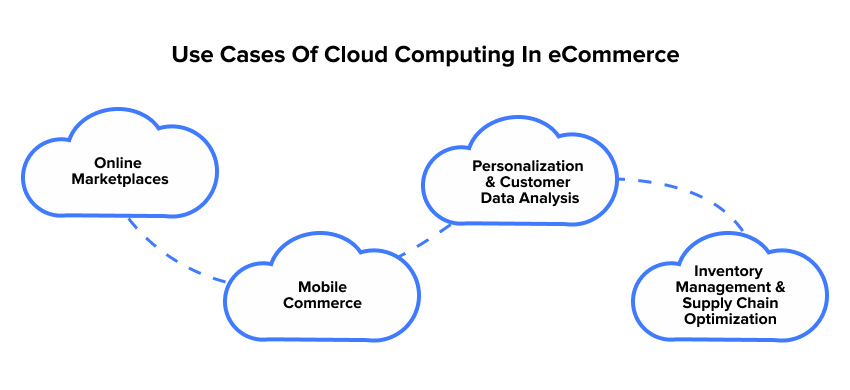
a. Online Marketplaces
In electronic commerce, online marketplaces are a common application of cloud computing. Several vendors can list and sell their wares on online marketplaces like Amazon and eBay.
Due to cloud computing, these marketplaces can accommodate a high volume of customers, sellers, and products without disrupting the user experience. In addition, to meet the ever-changing demands of their customers, cloud hosting companies supply elastically expandable system resources.
b. Mobile Commerce
Mobile commerce is a buzzing trend. The concept is similar but quite unique to eCommerce. It involves carrying your eCommerce ventures over a mobile-based audience.
Interestingly, the wide reach of cloud computing allows eCommerce business owners to expand their ventures across mobile phones. Entrepreneurs today can leverage different hosting services to add features and functions to their applications.
c. Personalization & Customer Data Analysis
Cloud computing also allows business owners to leverage personalization and customer data. Businesses can study consumer data and tailor their services using the robust data analysis capabilities made available by cloud hosting providers.
PProductized product recommendations, promotions, and pricing gleaned from an organization’s analysis of customer data are proven ways to boost customer retention and revenue.
D. Inventory Management & Supply Chain Optimization
Cloud computing can be used in supply chain management and inventory control. Cloud hosting can better manage a company’s inventory and supply chain.
Powerful inventory management tools are available from cloud hosting providers, allowing businesses to keep tabs on stock, forecast demand, and streamline their supply chain operations. This way, organizations save the funds that would’ve gone behind boosting order fulfilment, stock, and boost profits.
Challenges Of Cloud Computing In eCommerce
The rise of eCommerce has been massive in the past years. Today, we can integrate different solutions to operations at any level. For instance, eCommerce companies can leverage scalable resources over the cloud to serve their clients.
However, before you’re all set to use cloud computing to your advantage, ensure that your eCommerce company aligns with these aspects:
Integration With Legacy Systems
Integrating cloud computing with pre-existing eCommerce infrastructure is a significant obstacle. Legacy systems are extremely important to many companies, yet they may need to be compatible with cloud computing.
Businesses may need to spend time and money acquiring specialist knowledge to successfully integrate their old systems with cloud-based platforms.
Data Migration & Management
Regarding cloud computing for e-commerce, firms must also deal with data migration and management challenges. Moving massive amounts of data from on-premises storage to the cloud is a major undertaking for any corporation.
This process must be meticulously planned and executed to move data without losing or corrupting any of it successfully. In addition, once data is stored on the cloud, proper management is required to guarantee that it is backed up, safe, and easily accessible.
Vendor Lock-In And Data Ownership
Businesses that employ cloud computing for eCommerce face several key issues, including vendor lock-in and data ownership. Companies using cloud hosting for their eCommerce platform should ensure they have complete access to and the ability to migrate all their data.
The dangers of vendor lock-in, which can emerge if a company relies on a single cloud hosting provider for its infrastructure, should also be considered. This can make it harder for them to transfer to a different supplier in the future, increasing their prices and reducing their flexibility.
Best Practices For Cloud Computing In eCommerce
With the cloud, businesses can more easily scale their operations to meet client demand and consistently deliver their products and services. However, if a company wants to reap the full rewards of cloud computing, it must follow industry standards to keep its operations safe, streamlined, and low-priced.
Conducting A Thorough Cost-Benefit Analysis
The first thing you should do if you’re considering using cloud computing for your online site doing do a proper cost-benefit analysis. The benefits of increased scalability, flexibility, and reliability may not outweigh the costs for some businesses, so it’s important to weigh the full cost of adopting cloud computing, including the upfront costs of migration and the ongoing costs of cloud hosting.
Considerations, including traffic and transaction volumes, data storage and processing needs, and organizational objectives, should all go into such an analysis.
Choosing A Reliable And Secure Cloud Provider
Another crucial best practice for eCommerce cloud computing is selecting a trustworthy and secure cloud provider. While choosing a cloud hosting service, businesses should look at the firm’s track record, reliability, and security measures.
The cloud service must be highly available and uninterrupted in operation, with data centres located in multiple locations and failsafe mechanisms in place.
More is needed for a cloud service to meet minimum requirements; they must adhere to legislation, implement robust security measures, and update and patch their system frequently.
Implementing A Solid Disaster Recovery Plan
Another crucial component of cloud computing for online stores is a reliable disaster recovery strategy. An organization’s data and applications must continue to function in the case of a disaster or outage; thus, preparation for such an occurrence is essential.
This strategy should include a clear and detailed recovery method, regular backups, redundant storage and processing resources, and regular testing. It must be checked frequently to ensure the plan’s efficacy and efficiency.
Regularly Monitoring And Optimizing Cloud Performance
Regular cloud performance monitoring and optimization is a crucial best practice for cloud computing in eCommerce. Response time, availability, and scalability are all aspects of cloud infrastructure performance that businesses must monitor.
Accurate and thorough data, such as volume of traffic and transactions, data storage and processing needs, and user feedback, should form the basis of this monitoring. With this information, firms must optimize their cloud infrastructure by changing resource allocation, app performance, and security and compliance controls.
Case Studies Of Successful Cloud Computing In eCommerce
With its unparalleled scalability, flexibility, and reliability, cloud computing has become an integral part of eCommerce operations for businesses of all sizes. As a result, several eCommerce businesses have used cloud computing strategies to boost their operations, productivity, and client satisfaction.
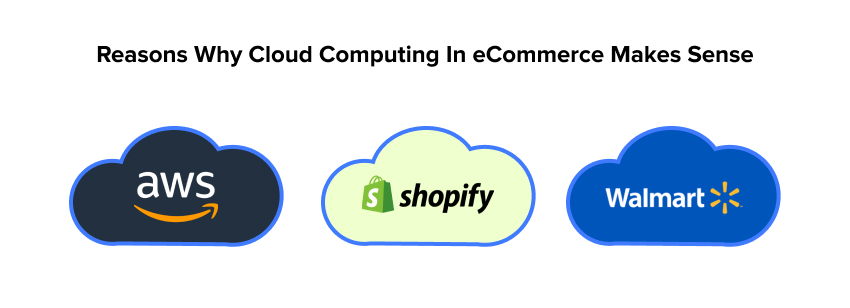
Amazon Web Services (AWS)
Amazon Web Services (AWS) is an eCommerce management service provided by Amazon.com, Inc., which operates as a cloud computing platform. Airbnb is a company that has benefited from using AWS.
The company’s website, mobile app, data storage, processing, analytics, and machine learning models are all hosted on Amazon. Airbnb has been able to swiftly and efficiently scale its resources thanks to AWS, which has resulted in lower costs and better performance.
Shopify
Shopify is another prosperous eCommerce platform offering cloud computing services. Shopify is a cloud-based e-commerce platform that allows businesses to set up and manage their online stores using tools like inventory management, payment processing, and customer support.
Kylie Cosmetics is one company that has made good use of Shopify; it uses the service to sell its wares to consumers worldwide. Kylie Cosmetics has expanded rapidly and smoothly thanks to Shopify, which has also improved the quality of the shopping experience for Kylie’s customers.
Walmart
Walmart is a global retail giant that has also mastered cloud computing to power its online store. Microsoft Azure is used for everything from the company’s eCommerce platform to its data storage, processing, and machine learning models. Azure’s scalability and adaptability have helped Walmart enhance its processes, cut costs, and deliver a more satisfying customer experience.
Walmart has used Microsoft Azure to create cutting-edge software like the Intelligent Retail Lab, which employs machine learning and computer vision to enhance stock-keeping and customer service.
Future Of Cloud Computing In eCommerce
As new technology and consumer habits continue to alter how businesses function and connect with their clientele, the future of cloud computing in eCommerce is bright. The use of cloud computing in the e-commerce sector is already widespread, and this trend is only projected to accelerate.
Emerging Technologies And Trends
Artificial intelligence (AI) is one of the developing technologies that have the potential to affect cloud computing in online retail (AI) significantly. Thanks to the possibilities of AI, you can now automate different aspects of your operations like invoice and inventory management.
Impact On The eCommerce Industry
The IoT or Internet of Things is another emerging technology that can be leveraged with the possibilities of cloud computing. As an emerging technology, IoT can streamline different aspects of eCommerce, like customer service, inventory management, and supply chain optimization, among others.
In A Nutshell
The advent of cloud computing has revolutionized the e-commerce industry, bringing increased performance, reliability, security, and scalability, among other advantages. However, since more and more people are making purchases online, retailers need to be agile and adaptable to keep up with demand.
Cloud computing makes this possible, which offers the requisite backend support for businesses to concentrate on their core competencies and expand or contract as needed.
As a result, despite the industry’s fierce competition, firms that embrace cloud computing now stand a good chance of succeeding in the years to come as this technology continues to advance.
FAQs
Using remote servers and networks, cloud computing in eCommerce means storing, managing, and processing data and applications connected to online shopping.
Cost reduction, scalability, flexibility, accessibility, enhanced performance, and uptime are just a few of the many advantages of cloud computing for e-commerce.
Security and privacy concerns, data governance and compliance issues, integration and interoperability concerns, vendor lock-in, and a lack of customization and control are all problems associated with cloud computing in the e-commerce sector.
As cloud computing continues to evolve in eCommerce, hybrid and multi-cloud environments will become increasingly important. Data privacy and sovereignty will also be critical, as well as sustainability efforts.
Related Articles
-
Have you developed your Ecommerce Platform with Odoo Integration? Learn From These Simple Tips!
Odoo is a framework that can help your business to smooth the management and operational process. It has been utilized by leading brands across the globe and named as truly
-
10 Ecommerce Trends to Boost Business Growth in 2020
Adapting to the dynamic needs of consumers is something that every eCommerce business owner does every day. It’s 2020 and if you own such a business, then get prepared! This
-
Azure Machine Learning: A Walkthrough to Know the Platform Better
Introduction A business might be on the verge of implementing machine learning in the organization’s operations. However, there might be some challenges that might hold it back in adopting the




